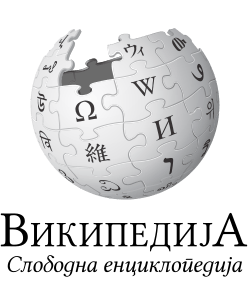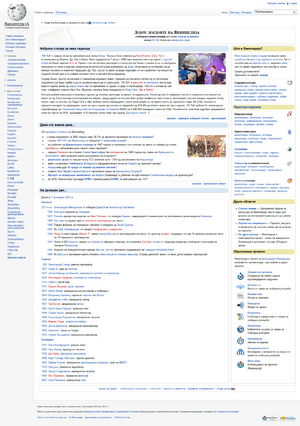Macedonian Wikipedia facts for kids
 |
|
 |
|
|
Type of site
|
Internet encyclopedia project |
|---|---|
| Available in | Macedonian |
| Owner | Wikimedia Foundation |
| Created by | Macedonian wiki community |
| Website | mk.wikipedia.org |
| Commercial | No |
| Registration | Optional |
| Launched | September 2003 |
The Macedonian Wikipedia (Macedonian: Википедија) is a special online encyclopedia. It is the version of Wikipedia written in the Macedonian language. This project started in September 2003. It helps people find information in their own language.
Contents
What is Macedonian Wikipedia?
The Macedonian Wikipedia is like a giant digital library. It contains thousands of articles on many different topics. All of these articles are written in the Macedonian language. It is part of the bigger Wikipedia family. Wikipedia is a free online encyclopedia. This means anyone can read it without paying. It is also a place where people can learn new things.
How it Started
The Macedonian Wikipedia began in September 2003. It was created to share knowledge with Macedonian speakers. At first, it had only a few articles. Over time, more and more people joined to help. They wrote new articles and improved old ones. This helped the encyclopedia grow.
How Many Articles?
The number of articles on Macedonian Wikipedia keeps growing. As of July 2013, it had over 72,000 articles. This shows how much information is available. Each article is like a page in a huge book. These pages cover everything from history to science. They also include information about famous people and places.
Who Makes it?
The articles on Macedonian Wikipedia are written by volunteers. These are people from all over the world. They love to share what they know. They work together to make sure the information is correct. Anyone can learn how to contribute. This makes Wikipedia a community project. The Wikimedia Foundation helps to run Wikipedia. It is a non-profit organization.
Why is it Important?
The Macedonian Wikipedia is very important for the Macedonian language. It helps to keep the language alive online. It also makes knowledge accessible to everyone. People can learn about many subjects in their native language. It is a great tool for students and curious minds. It helps spread information freely around the world.

